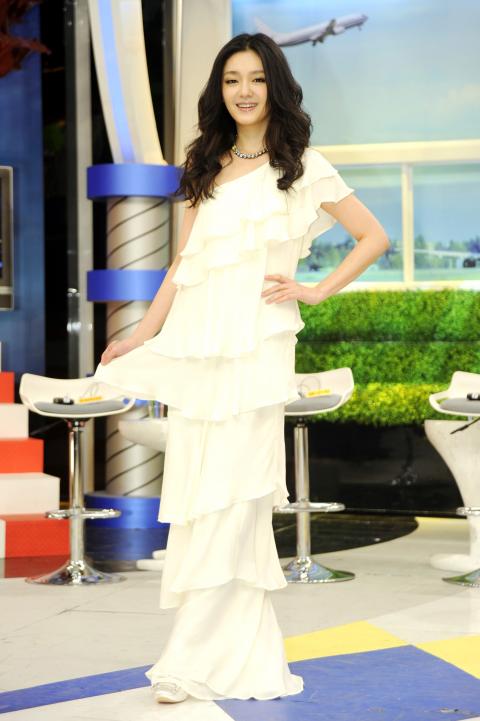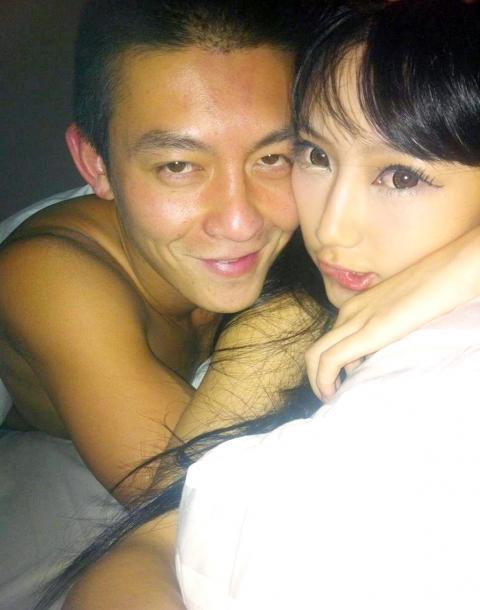This year was notable for its slew of showbiz weddings, one particularly nasty celebrity divorce and Edison Chen’s (陳冠希) continued lack of luck with keeping his private photos under wraps. Read on for more of this year’s juiciest gossip.
Celebs who tied the knot include TV personality Patty Hou (侯佩岑), singer Stephanie Sun (孫燕姿) and S.H.E member Selina Jen (任家萱), who wed 39-year-old lawyer Richard Chang (張承中) after enduring a year of medical treatments for burns she sustained while filming in China last year. The marriage of Barbie Hsu (徐熙媛, aka Big S) and multimillionaire Wang Xiaofei (汪小菲) was just one in a string of high-profile nuptials that took place last year, but the ceremony on China’s Hainan Island was noteworthy for its lavishness. The Apple Daily reported that the event cost NT$30 million. Hsu’s wedding dress and three reception gowns were worth more than NT$2 million, while a flight the couple chartered for guests set them back NT$4 million. Companies eager for publicity gifted other expenses, including hotel rooms and catering. Even the ring Wang placed on his bride’s hand was reportedly a freebie from sponsors.
While some of their entertainment industry peers were celebrating, the union of Cecilia Cheung (張柏芝) and Nicholas Tse (謝霆鋒) crashed in spectacular fashion after Cheung was photographed with her ex-lover Edison Chen while on an airplane.

Photo: Taipei Times
The duo infamously appeared in sexually explicit poses in photos taken by Chen and leaked on the Web in 2008, resulting in a career-busting scandal. Tse was reportedly enraged that Cheung was on friendly terms with Chen again. Rumors of marital strife between Tse and Cheung proved to be true with the announcement of their split in September after several months of bitter wrangling that reportedly centered on the couple’s real estate holdings and custody arrangements for their two sons.
Chen has been slowly trying to rebuild his career over the past three years with a scattering of appearances and promotional deals, but incriminating photos of him just keep popping up.
In addition to the “airplane incident” (機上事件) with Cheung, which took place in May, the 31-year-old Chen was also seen snuggling with 16-year-old model Cammi (real name Hsieh Chih-hui, 謝芷蕙) in a series of intimate, but not sexually explicit, snaps. The photos were allegedly leaked after Cammi lost her cell phone. She vehemently denied media reports that a raunchier two-minute video existed, and insisted that she is still a virgin.

Photo: Taipei Times
Jay Chou (周杰倫) also did his fair share of challenging the media. He has steadfastly denied rumors that he is in a relationship with teenage model Hannah Quinlivan (昆凌), but the two were spotted together on several occasions. Quinlivan was seen cruising around Taipei in one of Chou’s sports cars, which reporters took as a sign that the 18-year-old’s status as “J-wife” (J嫂) is official.
Chou, 32, told the media, however, that speculating about his marital status is pointless, because he has no plans to tie the knot until he is at least 35-years-old.
Meanwhile, the relationship between Chou’s most famous ex, pop diva Jolin Tsai (蔡依林), and male model Vivian Dawson (錦榮) appears to still be going strong, though rumors about the latter’s wandering eye appear from time to time.
Lin Chi-ling (林志玲) turned 37 this year, adding a new intensity to speculation about when the supermodel will finally get hitched. One possible contender for her hand is an ex, actor Jerry Yan (言承旭). Another is Scott Chiu (邱士楷), the son of a wealthy toilet manufacturer, but Lin has repeatedly insisted that their relationship is over. The media continue to bring up Chiu’s name, however, probably because it is fun to refer to him as the “toilet prince” (馬桶王子), as reporters occasionally do.
The media’s attempts to goad Chou and Lin into firm answers about their private lives were unsuccessful, but they scored with Hong Kong screen idol Andy Lau (劉德華) who finally confirmed last month that he and wife Carol Chu (朱麗倩) are expecting a baby. The famously discreet long-term couple managed to prevent the paparazzi getting shots of them together for 24 years before photos of the two holding hands hit newsstands in 2009.
Lau announced the pregnancy by thanking God for the “miracle” on his official Web site. The Liberty Times (the Taipei Times’ sister newspaper) remarked that it is indeed a miracle that the 45-year-old Chu managed to get knocked up. It appears that the pregnancy will be the gift that keeps on giving in 2012 as reporters keep their eyes locked on Chu’s belly.

Towering high above Taiwan’s capital city at 508 meters, Taipei 101 dominates the skyline. The earthquake-proof skyscraper of steel and glass has captured the imagination of professional rock climber Alex Honnold for more than a decade. Tomorrow morning, he will climb it in his signature free solo style — without ropes or protective equipment. And Netflix will broadcast it — live. The event’s announcement has drawn both excitement and trepidation, as well as some concerns over the ethical implications of attempting such a high-risk endeavor on live broadcast. Many have questioned Honnold’s desire to continues his free-solo climbs now that he’s a

As Taiwan’s second most populous city, Taichung looms large in the electoral map. Taiwanese political commentators describe it — along with neighboring Changhua County — as Taiwan’s “swing states” (搖擺州), which is a curious direct borrowing from American election terminology. In the early post-Martial Law era, Taichung was referred to as a “desert of democracy” because while the Democratic Progressive Party (DPP) was winning elections in the north and south, Taichung remained staunchly loyal to the Chinese Nationalist Party (KMT). That changed over time, but in both Changhua and Taichung, the DPP still suffers from a “one-term curse,” with the

Jan. 26 to Feb. 1 Nearly 90 years after it was last recorded, the Basay language was taught in a classroom for the first time in September last year. Over the following three months, students learned its sounds along with the customs and folktales of the Ketagalan people, who once spoke it across northern Taiwan. Although each Ketagalan settlement had its own language, Basay functioned as a common trade language. By the late 19th century, it had largely fallen out of daily use as speakers shifted to Hoklo (commonly known as Taiwanese), surviving only in fragments remembered by the elderly. In

Lines between cop and criminal get murky in Joe Carnahan’s The Rip, a crime thriller set across one foggy Miami night, starring Matt Damon and Ben Affleck. Damon and Affleck, of course, are so closely associated with Boston — most recently they produced the 2024 heist movie The Instigators there — that a detour to South Florida puts them, a little awkwardly, in an entirely different movie landscape. This is Miami Vice territory or Elmore Leonard Land, not Southie or The Town. In The Rip, they play Miami narcotics officers who come upon a cartel stash house that Lt. Dane Dumars (Damon)